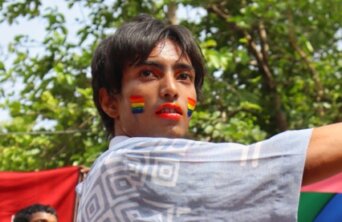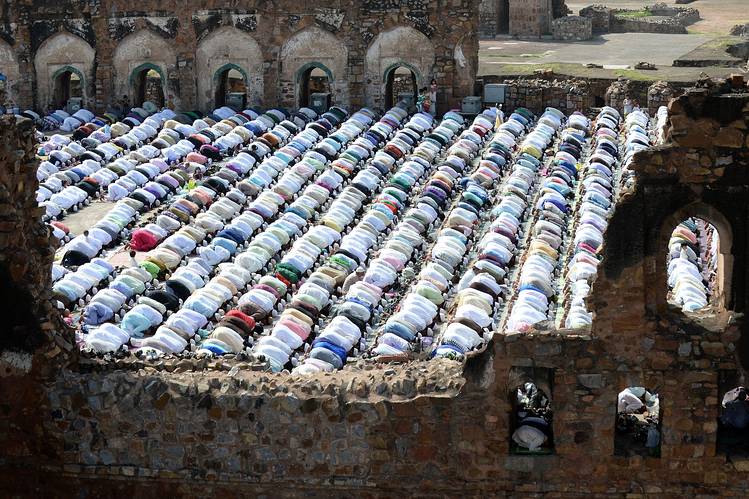- About
- Topics
- Picks
- Audio
- Story
- In-Depth
- Opinion
- News
- Donate
- Signup for our newsletterOur Editors' Best Picks.Send
Read, Debate: Engage.
| topic: | LGBT Rights |
|---|---|
| located: | India |
| editor: | Sanjana Chawla |
The hopes of LGBTQ+ individuals seeking marriage equality were dashed by the Supreme Court of India's disappointing decision on October 17, 2023. In a ruling that declined to legalise same-sex marriage, activists and same-sex couples were left disheartened, longing for the recognition of their right to marry regardless of gender.
India has a population of roughly 1.49 billion, of which approximately 140 million people belong to the LGBTQ+ community. Queer people in India lead a challenging life due to prevalent social stigma and discrimination. Despite the decriminalisation of consensual same-sex relationships in 2018, LGBTQ+ Indians still face significant hurdles, including societal rejection, isolation, and discrimination in various aspects of their lives, spanning education, employment, and healthcare.
According to the National Crime Records Bureau, there were 27 reported hate crimes, verbal abuse, harassment, and blackmailing against LGBTQ+ individuals in 2019. Continued advocacy, awareness, and legal protection play a part in creating a more inclusive and accepting society for queer people in India.
Supporters of marriage equality in India emphasised that the issue extended beyond legal matters, encompassing social justice and constitutional rights. They highlighted the discrimination faced by LGBTQ+ individuals and argued that legalising same-sex marriage would not only grant equal rights but also promote inclusivity. They proposed amendments to existing marriage laws to include same-sex unions, emphasising the importance of freedom of choice in selecting life partners.
Opposers of legalising same-sex unions in India argue that same-sex marriage disrupts societal harmony and conflicts with Indian cultural and religious values, which dictate marriage should remain a sacred union exclusively between a man and a woman.
In response to these divergent viewpoints, the Supreme Court chose not to legalise same-sex marriage outright but accepted the government's proposal to establish a committee. Led by a high-ranking official, this committee aims to examine current laws and recommend amendments to provide equal legal rights and benefits to same-sex couples.
Allies and same-sex couples argue that marriage equality is not merely a legal matter but a fundamental human rights issue.
They have received nationwide support despite the lack of resolve from the judiciary and power makers. The Humsafar Trust, one of the oldest LGBTQ+ organisations in India, continues to provide support, healthcare, legal aid, and counselling services to LGBTQ+ individuals. It also actively advocates for equal rights and social acceptance, including support for same-sex marriages, which is the need of the hour.
The Delhi-based Naz Foundation, instrumental in filing a petition against Section 377 of the Indian Penal Code in 2018 and raising a voice against decriminalising consensual same-sex relationships in India, is another leading people-based trust that has been vocal in supporting LGBTQ+ rights. Several lawyers nationwide have been at the forefront of fighting for LGBTQ+ rights in India and legal advocacy groups offering legal aid, legal recognition, and support for same-sex marriages.
Marriage equality requires a collective effort and constructive dialogue to reach a comprehensive solution. Public awareness campaigns have been critical, too; for instance, Queer Azadi Mumbai, an LGBTQ+ collective based in Mumbai that, actively campaigns for equal rights, inclusivity, and the recognition of same-sex marriages.
The goal is to promote understanding, empathy, and societal acceptance of same-sex relationships. At the grassroots level, providing support services, counselling, and engaging activists and communities empowers LGBTQ+ individuals and their allies. Carving a well-established channel of dialogue and engagement will pave the way for open and inclusive discussions among religious leaders, policymakers, activists, and the public. It will also help address concerns, dispel misconceptions, and foster understanding to find common ground.
The issue of same-sex marriage and the disappointing verdict are not new. The journey towards a more inclusive and egalitarian society has been ongoing for decades and continues to progress. The goal is simple: to create an accepting and equal space where love transcends gender boundaries, and all individuals have the freedom to marry whoever they love.
Image by Sneha Sivarajan.

